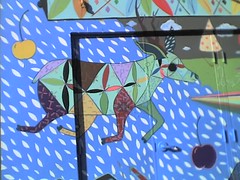Somehow a recent NYT Book Review convinced me that I needed to read this season's hott new thing, Special Topics in Calamity Physics by a much-blogged-about literary debutante, Marisha Pessl. It's no Secret History, if that's what you're looking for. It's not bad, but on the other hand it's not especially delicious, nor smart, nor scary. It also contains a few drawings done by the author, none of which are very interesting; the drawings are randomly scattered, not especially revealing, and actually in these regards, they sum up my ambivalence about the book. Also on the list: Nothing If Not Critical, a collection of art criticism by Time critic Robert Hughes. In general, I dislike "criticism" as a genre because it so frequently comes across as insulated from, I guess, reality. The very few successful critics succeed because their writing exposes the object of criticism to new light, a fresh perspective — and the list is short: Lester Bangs and Robert Hughes, maybe Anthony Lane. Hughes's review of Julian Schnabel's autobiography made me laugh out loud, repeatedly, even as I awaited a dentist appointment: "Schnabel is to painting what Stallone is to acting — a lurching display of oily pectorals — except that Schnabel makes bigger public claims for himself." Ziing! Now that's criticism! In 2003, the UK's Guardian published an interesting bit on Schnabel's endeavors to resurrect his career. Post Office by Charles Bukowski is both better and worse than I remembered it. I read it in my early 20's, a time when I could identify (or thought I could, anyway) with being down and out, so I admired the cranky tone, the disdain for the "straight" world and all the "suckers" who buy into it. Nowadays, I would probably qualify as a sucker, and I can confirm that the straight world really is as boring and soul-crushing as Bukowski presents it. As I was reading it, I kept thinking: What would Bukowski do in my situation? At the very least, he would stash a bottle of booze in his desk. And probably duck out for a stiff drink or two in between meetings.Finally, the best of the lot is Eric Newby's (mis)adventure classic A Short Walk in the Hindu Kush. What happens when two refined British gentlemen with no moutaineering experience decide (on a lark) to climb an 18,000-foot mountain in Nuristan, a warlord-controlled region of Afghanistan? The book chronicles this mid-1950's boondoggle, including Newby's means of traveling to Afghanistan — an automotive journey through Europe and the Middle East. [A sad note: Newby recently passed away. The BBC obit.]
Categories
